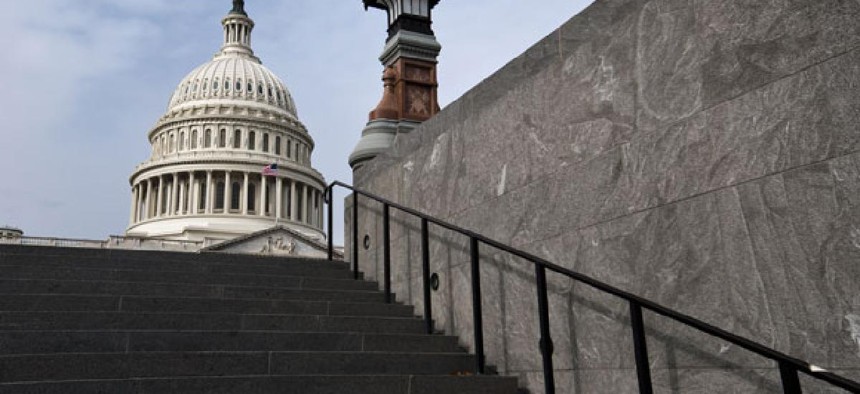
Orhan Cam/Shutterstock.com
Poll: Country divided over debt ceiling, deficit feduction
Respondents split on whether there should be a mixture of tax hikes and spending cuts.
Surveys showed that Americans sided with President Obama and Democrats in last month’s debate over extending the Bush tax cuts for most taxpayers, but according to a new United Technologies/National Journal Congressional Connection Poll, the country is more divided over how to reduce the deficit as the White House and Congress fight over the debt ceiling and sequestration.
Respondents to the new poll were split over whether further efforts to reduce the deficit should include a mixture of tax increases and spending cuts, as Democrats favor, or, as Republicans insist, spending cuts alone. Forty-nine percent favor reducing the deficit through spending cuts alone, while 48 percent prefer both tax increases and spending cuts.
The Congressional Connection Poll was conducted Jan. 10-13 by Princeton Survey Research Associates International, which surveyed 1,001 adults. This is the latest in a series of national polls tracking the public’s priorities for Congress -- and its assessment of Washington’s performance -- during most weeks that Congress is in session this year. The poll’s margin of error is plus or minus 3.7 percentage points.
The question of how to cut the federal deficit looms large over Congress this year. The poll informed respondents that the agreement to raise taxes on wealthy Americans “only covered a small portion of the projected deficit over the next 10 years.”
Democrats are more likely to favor tax increases along with spending cuts, preferring the mixture by a 21-point margin, 59 percent to 38 percent. Sixty-five percent of Republicans think the debt should be slashed by spending cuts alone, compared with only 31 percent who favor a mixed approach. Independents are more closely divided: 50 percent favor a mixture of tax increases and spending cuts, and 46 percent want only spending cuts.
The poll shows a slight gender gap, with men preferring only spending cuts, 52 percent to 45 percent, while women prefer the mixture of tax increases and spending cuts, 50 percent to 45 percent.
Respondents also diverged along income levels on this question. Half of those making less than $50,000 a year preferred only spending cuts, compared with 46 percent who preferred the mixture of spending cuts and tax increases. But that mixture was favored by 53 percent of those making $50,000 or more.
The lack of consensus among poll respondents, combined with the polarization driving the results, portends more partisan wrangling over the next few months on Capitol Hill over efforts to raise the federal debt ceiling, avoid drastic spending cuts in domestic and defense programs, and fund the federal government.
In the most recent fight, Congress agreed to raise tax rates -- to 39.5 percent from 35 percent -- for families making more than $450,000 a year. Asked about these new rates, 29 percent of poll respondents said that Congress should have set the threshold for tax increases at $250,000 a year, which was the amount originally preferred by President Obama. Thirty percent thought Congress was correct in raising taxes for income over $450,000. These results are consistent with polls taken before the fiscal-cliff agreement, which indicated strong support for hiking taxes on the wealthy. The actual agreement has been less popular, with most polls taken after Obama signed the bill into law showing Americans divided on the compromise.
The Republican-backed tax proposals are still less popular, the new poll shows. Just 12 percent think Congress should have raised taxes only for income over $1 million, the “Plan B” favored by House Speaker John Boehner. Twenty-three percent think Congress should not have raised taxes at all.
The poll also queried respondents about climate change. According to the National Climatic Data Center in Asheville, N.C., 2012 was the warmest year on record in the lower 48 states by a wide margin. The poll asked respondents if these records are more likely “the result in changes in the climate related to the burning of fossil fuels,” or if it is more likely “the result of factors like random weather variation.”
Half said that the extreme warmth was more likely random weather variation, compared with only 39 percent who thought it was a result of the burning of fossil fuels. Political partisanship was a fairly accurate predictor of how respondents answered this question: Republicans overwhelmingly say it was random variation, 63 percent to 26 percent. Democrats, on the other hand, lean toward fossil fuels, 50 percent to 41 percent.
Younger Americans were more likely to say that the record temperatures were the result of fossil-fuel consumption, with 54 percent of respondents ages 18-29 saying it was driven by those changes in the climate. Only 32 percent of those 65 and older agreed, however.
(Image via donvictorio / Shutterstock.com)






